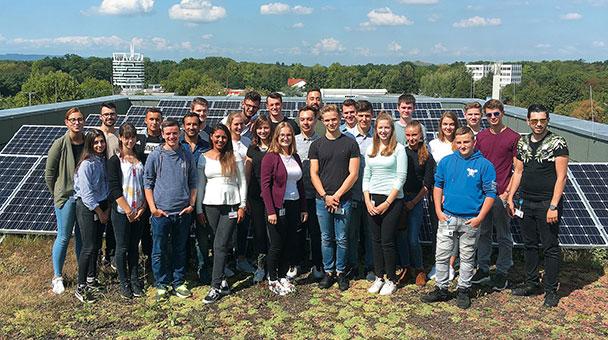Badenova has taken a pioneering step in Germany’s energy transition by launching the country’s first hydrogen pipeline in the southern region. This groundbreaking infrastructure project marks a significant milestone in promoting sustainable energy solutions and reducing carbon emissions. The new pipeline, which will transport green hydrogen to industrial and commercial users, underscores Badenova’s commitment to advancing the hydrogen economy and supporting Germany’s goal of achieving climate neutrality.
Badenova Advances Regional Energy Transition with Inauguration of Southern Germany’s First Hydrogen Pipeline
Badenova has marked a significant milestone in Germany’s energy landscape with the commencement of operations for its newly constructed hydrogen pipeline, the first of its kind in Southern Germany. Designed to transport green hydrogen produced from renewable resources, this infrastructure sets a precedent for regional decarbonization efforts by integrating clean energy more effectively into the existing supply networks. The pipeline, stretching over 15 kilometers, connects multiple industrial zones, enabling local businesses to transition from fossil fuels to sustainable hydrogen solutions with minimal disruption.
Key features of the pipeline include:
- State-of-the-art safety systems to monitor pressure and leakage in real-time
- Flexible capacity: Designed to handle up to 10 tons of hydrogen per day
- Interconnection capability: Compatible with future hydrogen infrastructure expansions across Baden-Württemberg
The project underscores Badenova’s commitment to accelerating the regional energy transition by creating a scalable and resilient hydrogen economy. Local authorities and industry leaders have expressed optimism, emphasizing the potential for the pipeline to serve as a blueprint for similar initiatives nationwide.
| Pipeline Attribute | Value |
|---|---|
| Length | 15 km |
| Daily Capacity | 10 tons |
| Start of Operation | Q2 2024 |
| Safety Features | Real-time monitoring |
| Region | Baden-Württemberg |
Technical Innovations Underpinning the Pipeline’s Construction and Operational Efficiency
The pipeline’s construction incorporates cutting-edge materials and advanced welding techniques designed to withstand the unique demands of hydrogen transport. Utilizing high-grade, corrosion-resistant steel alloys, the pipeline ensures minimal degradation over time despite hydrogen’s propensity to cause embrittlement in conventional metals. Additionally, state-of-the-art automated welding robots were deployed to guarantee uniform seam integrity and reduce construction timelines. Complementing the physical infrastructure, an integrated sensor network continuously monitors pressure, temperature, and potential leak points with real-time data analytics, enabling preemptive maintenance and increased operational safety.
Operational efficiency is further enhanced through the implementation of innovative compression stations optimized specifically for hydrogen’s low-density characteristics. These stations employ energy-efficient turbine compressors that adjust dynamically to fluctuating flow rates, ensuring consistent delivery volumes while minimizing energy consumption. A sophisticated SCADA (Supervisory Control and Data Acquisition) system oversees the entire pipeline network, supporting remote control and instant fault detection. Below is a summary of the key technical features that differentiate this project:
| Feature | Benefit |
|---|---|
| Corrosion-resistant steel | Extended pipeline lifespan |
| Automated welding robots | Enhanced construction precision |
| Real-time sensor network | Early leak detection and safety |
| Energy-efficient compressors | Lower operational costs |
| Advanced SCADA system | Remote monitoring and control |
Strategic Recommendations for Expanding Hydrogen Infrastructure Across Germany
To accelerate the nationwide adoption of hydrogen as a sustainable energy carrier, it is essential to focus on targeted expansion strategies that leverage existing networks while prioritizing technological innovation. Collaborative ventures between private energy firms like Badenova and public entities will be pivotal in orchestrating a cohesive hydrogen grid. Investing in modular pipeline systems designed for flexibility can significantly reduce installation times and facilitate rapid connectivity between renewable hydrogen production sites and industrial hubs.
Key strategic actions include:
- Prioritizing corridors linking southern Germany’s industrial centers with green hydrogen generation points to maximize economic impact.
- Enhancing cross-border interoperability with neighboring countries to create transnational hydrogen supply chains.
- Implementing robust safety protocols and leveraging smart sensor technology for real-time monitoring and leak detection.
- Encouraging public-private partnerships for funding and operational expertise sharing.
| Priority Area | Key Focus | Expected Benefit | |||||||||||
|---|---|---|---|---|---|---|---|---|---|---|---|---|---|
| Southern Germany | Pipeline Network Integration | Improved supply reliability | |||||||||||
| Cross-Border | Infrastructure Standardization | Enhanced trade opportunities | |||||||||||
| Technological Innovation |
If you want, I can also help you write a summary or develop additional strategic recommendations based on this content. Just let me know! Concluding RemarksBadenova’s launch of Southern Germany’s first hydrogen pipeline marks a significant milestone in the region’s energy transition, underscoring the growing commitment to sustainable and renewable energy sources. As the pipeline begins operation, it not only sets a precedent for future hydrogen infrastructure projects but also reinforces Germany’s broader strategy to reduce carbon emissions and achieve climate goals. Industry stakeholders and policymakers alike will be watching closely as this pioneering initiative paves the way for expanded hydrogen networks across the country and beyond. |




